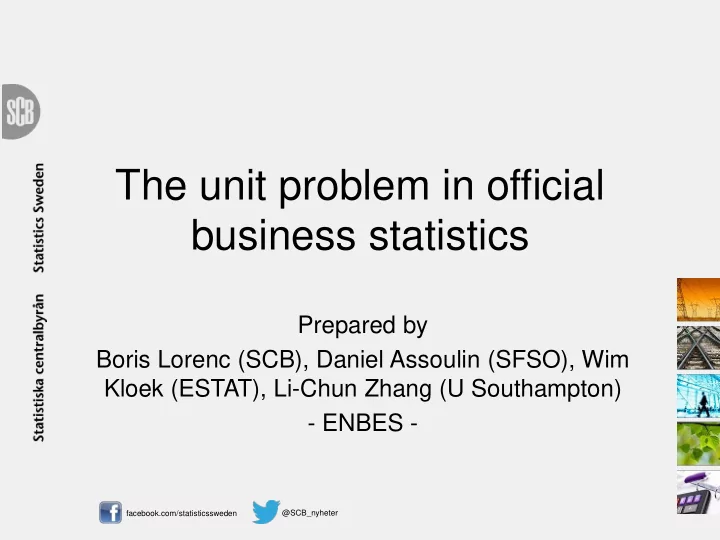

The unit problem in official business statistics Prepared by Boris Lorenc (SCB), Daniel Assoulin (SFSO), Wim Kloek (ESTAT), Li-Chun Zhang (U Southampton) - ENBES - facebook.com/statisticssweden @SCB_nyheter
Error sources in surveys Survey methodologists generally recognise specification error frame error sampling error measurement error nonresponse error processing error 2
An error source is missing 9 % of objects in Statistics Sweden’s farm register were in error in a core register variable due to “ errors in objects ” (Wallgren and Wallgren, 2007:102) erroneous equating of enterprise to legal unit leads to 38% of employees associated in business demography to SMEs (other than micro) in fact belong to enterprise groups (from Brion et al., 2014, p.6) errors in produced statistics by size classes: 56% of the value added, 77% of fixed assets and 59% of export sales not allocated to large enterprises (from Brion et al., 2014, p.6) total turnover of 19 large French groups with 30 enterprises and 1226 legal units being 30% higher than when account consolidation based on profiling is done (Brion et al., 2014, p.8) probability of error in assigning enterprises <10 empl. to NACE activity classes ranges from 3% to 98%, with an unweighted median of 37% (van Delden and Scholtus, 2014, p.19) 3
The unit error Error in produced statistics due to deviations, systematic and random, from correctly identifying units, their properties and their relations, leading to observation and data collection (or failure to do so) from not fully correctly identified, characterised and delineated, units and unit groups. Earlier/ongoing work Difficulties with units in business statistics discussed especially in the 1990s (Struijs, Struijs & Lavallée, Struijs & Willeboordse, Pietsch,...) Treated theoretically in the context of social statistics by Zhang (2011), also generally in the context of producing statistics based on admin data (Zhang, 2012) Is to be included in some future systems for economic statistics production (e.g. a revision of INSEE’s ESANE) But much remains to be done 4
More research needed On the rule-based approach to the unit error quantitative measurements of the process (error types, consequences, significance for produced statistics) formal approaches to investigating simplifications of the system of units for economic statistics production On the statistical approach to the unit error formal frameworks models evaluation connecton to the body of statistical theory of estimation in a total survey quality/total survey error perspective 5
Some specific ideas Are administrative units in a business register less prone to unit errors than statistical units? Why? Explain the process! How can national profiling (bottom-up) successfully meet global profiling (top-down)? Devise methods! Some variables are thought to be less prone to errors that depend on unit structure (additive variables) than others. Explore whether this always holds, if not define dependencies! Further work on theory and practices of combining full/manual profiling of large units with automatic/statistical treatment of other units 6
Collaboration on the unit error ENBES, a European network of researchers and practitioners from academia, official statistics and private sector in business and economic statistics, is engaged in strengthening work (research, improved applications) on the unit problem in business statistics The Unit Problem workshop (Geneva, Switzerland, November 10, 2014) To be treated at The European Establishment Statistics Workshop (Poznan, Poland, September 7-9, 2015) Also to be treated on The 5th International Conference on Establishment Surveys (Geneva, Switzerland, June 20-23, 2016) All links at www.enbes.org 7
Networking The Wiesbaden Group on Business Registers / The Joint UNECE/Eurostat/OECD Expert Group on Business Registers Eurostat Task Force on Statistical Units Intersecretariat Working Group on National Accounts ’s Task Force on Statistical Units Some people interested in the unit problem in business stats: Daniel Assoulin, Swiss Federal Sander Scholtus, Statistics Statistical Office Netherlands Philippe Brion, INSEE Gianluca Spina, Polytechnic University of Milan Arnout van Delden, Statistics Netherlands Roland Sturm, Destatis Thomas Deroyon, INSEE Steven Vale, UNECE Tihomira Dimova, UNECE Harrie van der Ven, Statistics Netherlands Emmanuel Gros, INSEE Frank Verschaeren, Statistics Wim Kloek, Eurostat Belgium Boris Lorenc, Statistics Sweden Li-Chun Zhang, Univ of Norbert Rainer, Statistics Austria Southampton, Statistics Norway 8
Thank you! info@enbes.org or individual email addresses See you at the European Establishment Statistics Workshop (Poznan, Poland, September 7-9, 2015) – abstract deadline extended to March 15th Also at the 5th International Conference on Establishment Surveys (Geneva, Switzerland, June 20-23, 2016) – invited sessions submission deadline March 31st All links at www.enbes.org 9
References Brion, Philippe, Thomas Deroyon and Emmanuel Gros (2014). A first assessment of profiling in France. Presented at ENBES workshop The Unit Problem in Business Statistics (Geneva, 10 November 2014) van Delden, Arnout, and Sander Scholtus (2014). Effect [of] classification errors on uncertainty of estimates. Presented at ENBES workshop The Unit Problem in Business Statistics (Geneva, 10 November 2014) Zhang, Li- Chun (2011). “A unit -error theory for register-based household statistics”. Journal of Official Statistics , 24:3, 415 – 432 Zhang, Li-Chun (2012 ). “Topics of statistical theory for register- based statistics and data integration”. Statistica Neerlandica, 66:1, pp. 41 – 63 10
Recommend
More recommend